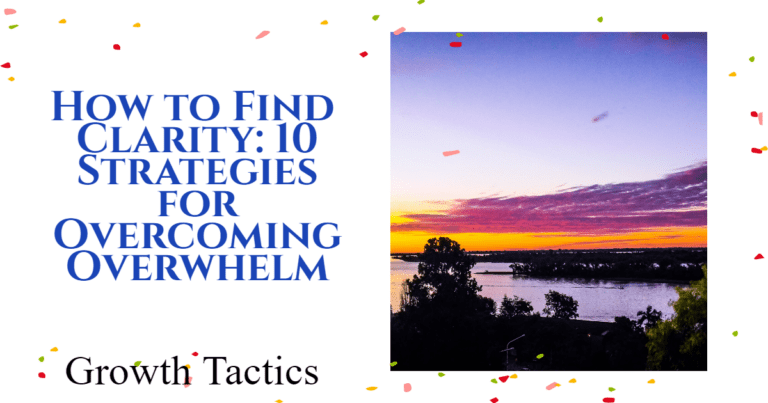In our fast-paced, chaotic lives, finding clarity can feel like an elusive goal. The constant stream of stimuli, responsibilities, and distractions often leave us feeling overwhelmed and confused. However, by implementing specific strategies and shifting our mindset, we can regain mental clarity and navigate through life with ease. In this guide, we will explore ten effective strategies that can help you find clarity and overcome overwhelm.
Jump To Section
Embrace Mindfulness
In the quest for clarity, embracing mindfulness is key. Mindfulness is the practice of being fully present in the current moment, without judgment. By cultivating this practice, we can let go of distractions, reduce stress, and alleviate confusion.
To incorporate mindfulness into your daily routine, consider:
Meditation
Take a few minutes each day to sit in a quiet space and focus on your breath or a specific mantra. Meditation allows you to observe your thoughts and emotions without getting caught up in them. This practice can train your mind to stay present and bring clarity to your thoughts.
Breathing Exercises
Engage in deep breathing exercises to bring your attention back to the present moment. By focusing on your breath, you can calm your mind and reduce feelings of overwhelm.
Momentary Awareness
Throughout your day, take brief moments to pause and observe your thoughts, emotions, and sensations. This simple act of awareness can help you detach from the chaos around you and find clarity in the midst of confusion.
Identify Sources of Confusion
To find clarity, it’s important to identify the factors in our lives that contribute to confusion. These can include relationships, habits, and daily routines that drain our mental energy. By examining and addressing these sources, we can create space for mental clarity to thrive.
Assess Your Relationships
Evaluate your relationships to determine if any are toxic or unfulfilling. These relationships can create confusion and hinder your ability to find clarity. Consider setting boundaries or seeking support in navigating these challenging dynamics.
Examine Unhealthy Habits
Identify unhealthy habits that contribute to confusion and overwhelm. This could include excessive use of technology, poor time management, or engaging in negative self-talk. By recognizing these habits and replacing them with healthier alternatives, you can create an environment that fosters clarity.
Prioritize Self-Care to Find Clarity
Neglecting our well-being is a common cause of overwhelm and confusion. Prioritizing self-care is crucial for finding and maintaining clarity in our lives.
Engage in Relaxing Activities
Make self-care activities a regular part of your routine. Engage in activities that promote relaxation, such as reading a book, taking a walk in nature, practicing a hobby you enjoy, or even taking a warm bath. By setting aside time for these activities, you create space for mental clarity to flourish.
Establish Boundaries
Set clear boundaries to protect your mental and emotional well-being. Learn to say ‘no‘ when necessary and avoid overcommitting yourself. By honoring your own limits and needs, you can prevent overwhelm and maintain clarity in your daily life.
Take Action
Finding clarity involves taking action and making intentional choices. Break down overwhelming tasks into small, manageable steps. By focusing on one task at a time, you can avoid feeling overwhelmed and make progress towards your goals. Taking action not only leads to clarity but also empowers you to regain control over your life.
Prioritize and Break Down Tasks
Identify the most important tasks that contribute to your overall clarity and wellbeing. Break them down into smaller, achievable steps. By tackling these smaller steps one by one, you can build momentum and make progress towards your goals.
Time Management
Manage your time effectively by setting clear priorities, creating to-do lists, and establishing a schedule. Allocate dedicated time for each task and avoid multitasking. By approaching tasks with a focused mindset, you can enhance productivity and clarity.
Celebrate Progress
Acknowledge and celebrate your accomplishments along the way. Recognize the effort and dedication you put into each step. Celebrating progress can motivate and inspire you to continue moving forward.
Shift Your Mindset
Our mindset plays a vital role in our ability to find clarity. Adopt a growth mindset, believing that confusion and overwhelm are temporary challenges that can be overcome with effort and learning. Embrace the belief that clarity is achievable and that you have the power to make necessary shifts in your life.
Practice Self-Compassion
Be kind and compassionate towards yourself as you navigate through confusion. Recognize that it is normal to feel overwhelmed at times and that it is an opportunity for growth. Treat yourself with patience and understanding, focusing on progress rather than perfection.
Embrace Learning and Growth
View confusion and challenges as opportunities for learning and personal growth. Embrace the mindset that every experience, whether positive or negative, can provide valuable lessons and insights. Learn from your mistakes and use them as stepping stones towards clarity.
Create a Supportive Environment
Surround yourself with individuals who uplift and support you on your journey towards clarity. Build relationships with like-minded people who understand your goals and challenges. Engaging in meaningful conversations, seeking guidance, and sharing experiences can provide valuable insights and encouragement.
Seek Support
Reach out to mentors, coaches, or trusted friends who can provide guidance and support. Share your challenges and seek their input and advice. Having a support system can provide valuable perspectives and ideas to help you navigate through confusion.
Limit Negative Influences
Evaluate the influences in your environment, such as social media or negative relationships, that may hinder your clarity. Be mindful of the content you consume and the company you keep. Surround yourself with positive influences that align with your values and aspirations.
Engage in Regular Reflection
Carve out time for introspection and reflection. Journaling can be an effective tool to gain clarity and understanding of your thoughts, emotions, and goals. Regularly reviewing your progress, challenges, and achievements can help you identify patterns, make necessary adjustments, and maintain a clear perspective.
Journaling
Take time each day or week to sit down and jot down your thoughts and reflections. Write about your goals, challenges, and any insights that arise. Reflecting through journaling can help you gain clarity on your values, identify patterns of confusion or overwhelm, and develop strategies for moving forward.
Reviewing Progress
Periodically review your progress, both personally and professionally. Take note of the areas where you have gained clarity and the steps you have taken to overcome confusion. Celebrate your achievements and use them as motivation to continue seeking clarity in other areas of your life.
Implement Effective Time Management
Prioritize your time by identifying your most important tasks and setting clear boundaries. Avoid multitasking, as it often leads to decreased focus and increased confusion. By managing your time effectively, you can reduce overwhelm and create space for mental clarity to thrive.
Prioritizing Tasks
Identify the tasks that have the biggest impact on your clarity and overall well-being. Make these tasks a priority and focus your time and energy on completing them. By breaking down larger tasks into smaller, actionable steps, you can make progress and maintain clarity along the way.
Setting Boundaries
Establish clear boundaries around your time and energy. Learn to say no to activities or commitments that don’t align with your priorities or contribute to your clarity. Protect your time by setting aside dedicated blocks for focused work, self-care, and reflection.
Seek Guidance
Sometimes finding clarity requires seeking guidance from professionals or mentors. Consider working with a therapist, coach, or mentor who can provide support, insights, and tools to navigate through confusion. Their expertise can guide you towards a clearer mindset and help you overcome overwhelming challenges.
Therapist or Counselor
A therapist or counselor can provide a safe and non-judgmental space for you to explore your thoughts and emotions. They can help you gain perspective, develop coping strategies, and work through any underlying issues that may be contributing to confusion or overwhelm.
Coach or Mentor
Engaging with a coach or mentor who specializes in clarity and personal development can provide valuable guidance and accountability. They can offer tools, techniques, and practical advice to help you navigate through confusion and make intentional choices towards clarity.
Cultivate Overall Wellness
Clarity is not achieved solely through mental means; it requires a holistic approach to wellness. Take care of your physical health through regular exercise, healthy eating, and sufficient sleep. Nourish your mind through reading, learning, and engaging in stimulating activities. By prioritizing your overall wellness, you create a foundation for mental clarity to thrive.
Physical Well-being
Ensure that you are taking care of your body by engaging in regular exercise, eating nutritious meals, and getting enough sleep. Physical well-being provides the energy and vitality needed to maintain mental clarity.
Mental Stimulation
Feed your mind with stimulating activities such as reading books, engaging in thought-provoking conversations, and pursuing hobbies or interests that challenge you. Continuous learning and mental stimulation contribute to expanding your perspective and maintaining clarity.
Emotional Balance
Pay attention to your emotional well-being and practice techniques that help regulate your emotions, such as mindfulness, deep breathing exercises, or seeking support from loved ones. Emotional balance creates a stable foundation from which you can navigate through confusion and achieve clarity.
Conclusion
Finding clarity is a journey, and it requires dedication and conscious effort. By implementing these ten strategies and adopting a mindset of growth and self-care, you can overcome overwhelm, confusion, and stress. Embrace mindfulness, take action, and prioritize your well-being. Remember, clarity is within reach, and with these strategies, you can navigate through life with a newfound sense of purpose and mental clarity.


